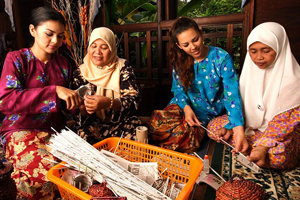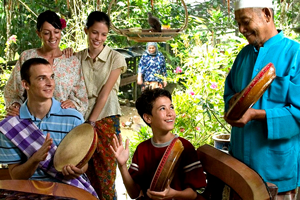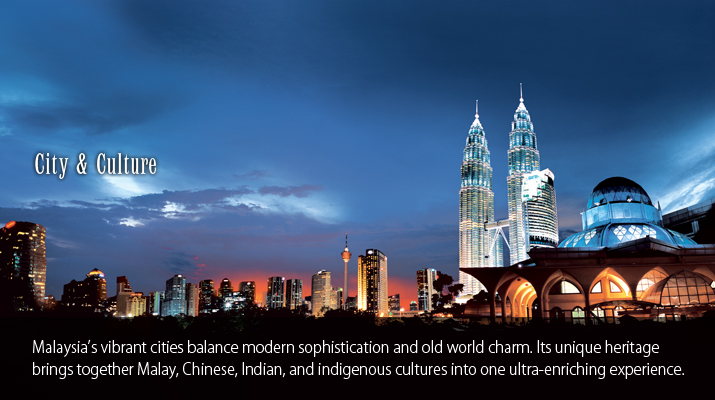For more information please click on the Malaysian package you desire, and contact a travel agent near you
Country: The Federation of Malaysia comprises Peninsula Malaysia and the states of Sabah and Sarawak on the island of Borneo.
Visa: Canadian passport holders can visit Malaysia for up to 3 months without a visa.
For further information please check the list of the countries and respective visa requirements at http://www.kln.gov.my.
Geographical Location
Located between 2º and 7º north of the Equator, Peninsula Malaysia is separated from the states of Sabah and Sarawak by the South China Sea. To the north of Peninsula Malaysia is Thailand while its southern neighbour is Singapore. Sabah and Sarawak are north of Indonesia in Borneo while Sarawak also shares a border with Brunei.
Capital: Kuala Lumpur
People: Malays who make up about 57% of the population are the predominant group with Chinese, Indians and other ethnic groups making up the rest.
Located between 2º and 7º north of the Equator, Peninsula Malaysia is separated from the states of Sabah and Sarawak by the South China Sea. To the north of Peninsula Malaysia is Thailand while its southern neighbour is Singapore. Sabah and Sarawak are north of Indonesia in Borneo while Sarawak also shares a border with Brunei.
Capital: Kuala Lumpur
People: Malays who make up about 57% of the population are the predominant group with Chinese, Indians and other ethnic groups making up the rest.
Language: Bahasa Melayu (Malay) is the national language but English is widely spoken. The ethnic groups also speak various languages and dialects.
Religion: Islam is the official religion but all other religions are freely practiced.
Government: Malaysia is governed by a Parliamentary democracy with a bicameral legislative system. The Head of State is the Yang Di-Pertuan Agong, a position that is awarded to a different State Monarch every five years and the Head of Government is the Prime Minister.
Climate: Tropical climate with warm weather all year round. Temperatures in the lowlands range from 21ºC (70ºF) to 32ºC (90ºF). The highlands are cooler, where temperatures range between 15°C (59° F) to 25°C (77°F). Annual rainfall varies from 2,000mm to 2,500mm.
Major Holidays: New Year's Day Hari Raya Aidiladha* Federal Territory Day ** Chinese New Year* Awal Muharam* Birthday of Prophet Muhammad* Labour Day* Wesak Day* King's Birthday* National Day* Deepavali# Hari Raya Aidilfitri* Christmas*
Note: (*) - National holidays (**) - Putrajaya, Kuala Lumpur & Labuan only (#) - Except Labuan & Sarawak
Economic Profile: Manufacturing constitutes the largest single component of Malaysia's economy. Tourism and primary commodities such as petroleum, palm oil, natural rubber and timber are other major contributors to the economy.
Distance to Kuala Lumpur, Malaysia
London, United Kingdom to Kuala Lumpur: 6,557 miles (10,552 km)
Paris, France to Kuala Lumpur: 6,483 miles (10,432 km)
Rome, Italy to Kuala Lumpur: 6,038 miles (9,716 km)
Stockholm, Sweden to Kuala Lumpur: 5,812 miles (9,353 km)
Berlin, Germany to Kuala Lumpur: 5,979 miles (9,622 km)
Madrid, Spain to Kuala Lumpur: 6,885 miles (11,079 km)
New York, USA to Kuala Lumpur: 9,400 miles (15,126 km)
Los Angeles, USA to Kuala Lumpur: 8,790 miles (14,144 km)
Vancouver, Canada to Kuala Lumpur: 7,944 miles (12,783 km)
Currency: The exchange rate for the Malaysian Ringgit is roughly 3.20 MYR to 1 Canadian dollar. Foreign currency can be converted at banks and money changers.
Banking Hours: Most states: Mon - Fri: 9.15am to 4.30pm. Sat & Sun: Closed (Selected banks and branches are open on Sat). Kelantan & Terengganu: Sun - Wed :9.15am to 4.30pm. Thurs :9.15am to 4.00pm. Friday/Saturday*/Public Holiday: Closed
The Malaysian unit of currency is the Ringgit Malaysia (RM), which is divided into 100 sen. Currency comes in notes of RM1, RM5, RM10, RM50 and RM100. Coins are issued in 1 sen, 5 sen, 10 sen, 20 sen, and 50 sen denominations.
Post Offices: Open from 8.30am to 5.00pm daily except the first Saturday of each month, Sundays and public holidays.
In Kelantan and Terengganu post offices operate during the same hours but are closed on Fridays and public holidays.
Time: Eight hours ahead of GMT and 16 hours ahead of U.S. Pacific Standard Time.
Electricity: Voltage is 220 - 240 volts AC at 50 cycles per second. If you are planning to bring any electrical equipment of 110 volts, it would be recommended to pack a converter. Power sockets employ the three-square-pin (British) type, although some older places have three-round-pin sockets.
Weights and Measures: Malaysia follows the metric system in weights and measures.
Telephones: Local calls can be made from public phones using coins or pre-paid cards. International calls can be made from public phones with card phone facilities or at any Telekom office.
Bahasa Melayu (Malay) is the national language but English is widely spoken. The ethnic groups also speak various languages and dialects.
Religion: Islam is the official religion but all other religions are freely practiced.
Government: Malaysia is governed by a Parliamentary democracy with a bicameral legislative system. The Head of State is the Yang Di-Pertuan Agong, a position that is awarded to a different State Monarch every five years and the Head of Government is the Prime Minister.
Climate: Tropical climate with warm weather all year round. Temperatures in the lowlands range from 21ºC (70ºF) to 32ºC (90ºF). The highlands are cooler, where temperatures range between 15°C (59° F) to 25°C (77°F). Annual rainfall varies from 2,000mm to 2,500mm.
Major Holidays: New Year's Day Hari Raya Aidiladha* Federal Territory Day ** Chinese New Year* Awal Muharam* Birthday of Prophet Muhammad* Labour Day* Wesak Day* King's Birthday* National Day* Deepavali# Hari Raya Aidilfitri* Christmas*
Note: (*) - National holidays (**) - Putrajaya, Kuala Lumpur & Labuan only (#) - Except Labuan & Sarawak
Economic Profile: Manufacturing constitutes the largest single component of Malaysia's economy. Tourism and primary commodities such as petroleum, palm oil, natural rubber and timber are other major contributors to the economy.
Currency: The exchange rate for the Malaysian Ringgit is roughly 3.20 MYR to 1 Canadian dollar. Foreign currency can be converted at banks and money changers.
Banking Hours: Most states: Mon - Fri: 9.15am to 4.30pm. Sat & Sun: Closed (Selected banks and branches are open on Sat). Kelantan & Terengganu: Sun - Wed :9.15am to 4.30pm. Thurs :9.15am to 4.00pm. Friday/Saturday*/Public Holiday: Closed
Post Offices: Open from 8.30am to 5.00pm daily except the first Saturday of each month, Sundays and public holidays.
In Kelantan and Terengganu post offices operate during the same hours but are closed on Fridays and public holidays.
Time: Eight hours ahead of GMT and 16 hours ahead of U.S. Pacific Standard Time.
Electricity: Voltage is 220 - 240 volts AC at 50 cycles per second. If you are planning to bring any electrical equipment of 110 volts, it would be recommended to pack a converter. Power sockets employ the three-square-pin (British) type, although some older places have three-round-pin sockets.
Weights and Measures: Malaysia follows the metric system in weights and measures.
Telephones: Local calls can be made from public phones using coins or pre-paid cards. International calls can be made from public phones with card phone facilities or at any Telekom office.
 |
 |
 |
Everyday etiquette is relaxed and straightforward. Visitors behaving courteously are unlikely to unintentionally give offense. The following are some guidelines when traveling to Malaysia.
- Although handshakes are generally acceptable for both men and women, some Muslim ladies may acknowledge introductions to gentlemen by merely nodding and smiling. A handshake should only be initiated by ladies. The traditional greeting or salam resembles a handshake with both hands but without the grasp. The man offers both hands, lightly touches his friends outstretched hands, and then brings his hands to his chest to mean, "I greet you from my heart". The visitor should reciprocate the salam.
- It is polite to call before visiting a home.
- Shoes must always be removed when entering a Malaysian home.
- Drinks are generally offered to guests. It is polite to accept.
- The right hand is always used when eating with one's hand or giving and receiving objects.
- The right forefinger is not used to point at places, objects or persons. Instead, the thumb of the right hand with four fingers folded under is the preferred usage.
- Shoes must be removed when entering places of worship such as mosques and temples. Some mosques provide robes and scarves for female visitors. Taking photographs at places of worship is usually permitted but always ask permission beforehand.
- Toasting is not a common practice in Malaysia. The country's large Muslim population does not drink alcohol.
- Seniority is greatly respected within Malay households. The eldest male of a family should be greeted first and frequently sits in the best or highest seat.
- Pointing with a finger is considered to be extremely rude. Instead, the entire hand should be used to indicate a direction, but not a person.
- Although no host will insist upon it, it is polite to remove one's shoes at the door of a house upon entering. It is also customary to do so upon entering a mosque or an Indian temple.
- Comfortable and informal clothing is suitable during the day and recommended all year round because of the tropical climate. However, as Malaysia is a predominantly Muslim country, conservative dress is most appropriate. Women should not wear dresses, skirts or shorts that are too short. In cities, towns and villages, shorts are considered highly inappropriate.
Do not dress in any manner that may give the impression that you are a "hippie," as "hippies" are banned from the country. For formal occasions or evening wear, formal attire is expected. Men should wear a suit and tie or a long-sleeved batik shirt. Evening dresses or cocktail dresses are recommended for women.
| Why I Love Malaysia - Margaret Deefholts | ||
 |
Having visited Malaysia four times, (and will happily return again someday), it is my privilege to introduce readers to a country that offers visitors a myriad choices: adventure, culture, history, spectacular scenery, colourful bazaars, and so much more. Take your pick: explore the jungles of Taman Negara Wilderness Resort, snorkel on the beaches of the South China Seas in the Tunku Abdul Rahman Marine Park, watch baby turtles hatch along the shore, sample life in a tribal longhouse among one-time headhunters living deep in the forests of Borneo, catch a glimpse of the endangered Proboscis monkey with his Jimmy Durante snozzle, see close up the astonishingly human, and often mischievous, Orang-utans as they lunch on bananas and milk at the Orang-utans Rehabilitation Centre near Sandakan. Malaysia is a middle-of-the road Muslim country, which in addition to Malays, and indigenous tribal Bumiputras, (roughly translated as “sons of the soil”) also includes Chinese and Hindu communities. Apart from resplendent mosques, visitors are also welcome to drop into Buddhist shrines and Hindu temples. The Malaysian calendar is thronged with festivals celebrating each one of these cultures but probably the most flamboyant of all is their annual Chitrawarna, “Colours of Malaysia” parade in May. The parade boasts ethnic floats (Malay, Indian, Chinese and the country’s indigenous peoples) with dances, music and costumes to rival Brazil’s Carnival show. Fire up your cameras! Want to shop? You’ve come to the right place. The Malaysian Ringett fares wonderfully well against the Canadian dollar, and Kuala Lumpur has swanky world class shopping malls to satisfy most addictive shopaholic. Food? Dine on superb cuisine in K.L.’s sophisticated air-conditioned restaurants; follow the siren call of nightclubs with their music wafting out onto the city sidewalks on warm evenings. Or if you are like me, get adventurous: sample Chinatown’s mouth watering street food cooked in steaming woks on sidewalks. Right next to the foodie stalls, is Chinatown’s bustling night market, where bargains abound. Sharpen your haggling skills and dive into the fray. But above all, what is it that has taken me back time and again to Malaysia? It is the people. Gentle, smiling, warm, and genuinely welcoming, the Malaysians are proud of their country and want nothing more than to show you, their honoured guest, the best that it has to offer. Do take them up on it! Travel Writer, Photographer & EditorAuthor: Haunting India Co-owner: Travel Writers Tales http://www.travelwriterstales.com/ Past President: B.C. Association of Travel Writers Member: Travel Media Association of Canada Member: Federation of B.C. Writers Website: http://www.margaretdeefholts-journeys.com |
|
Press Releases
2014/12/12
 Go ECO, Go Green Malaysia!
Go ECO, Go Green Malaysia!
Malaysia is indeed blessed with a wide range of natural and cultural assets that makes ecotourism a highly beneficial, feasible, sustainable and long-term form of tourism. |
Featured Story
"Travel With Us Malaysia" ventures out on a journey exploring the serene land of Malaysia.
|




















